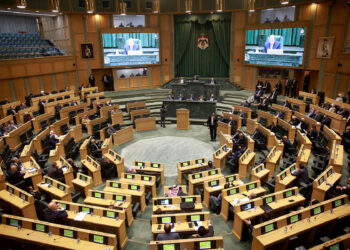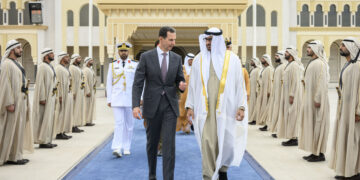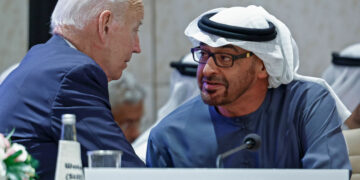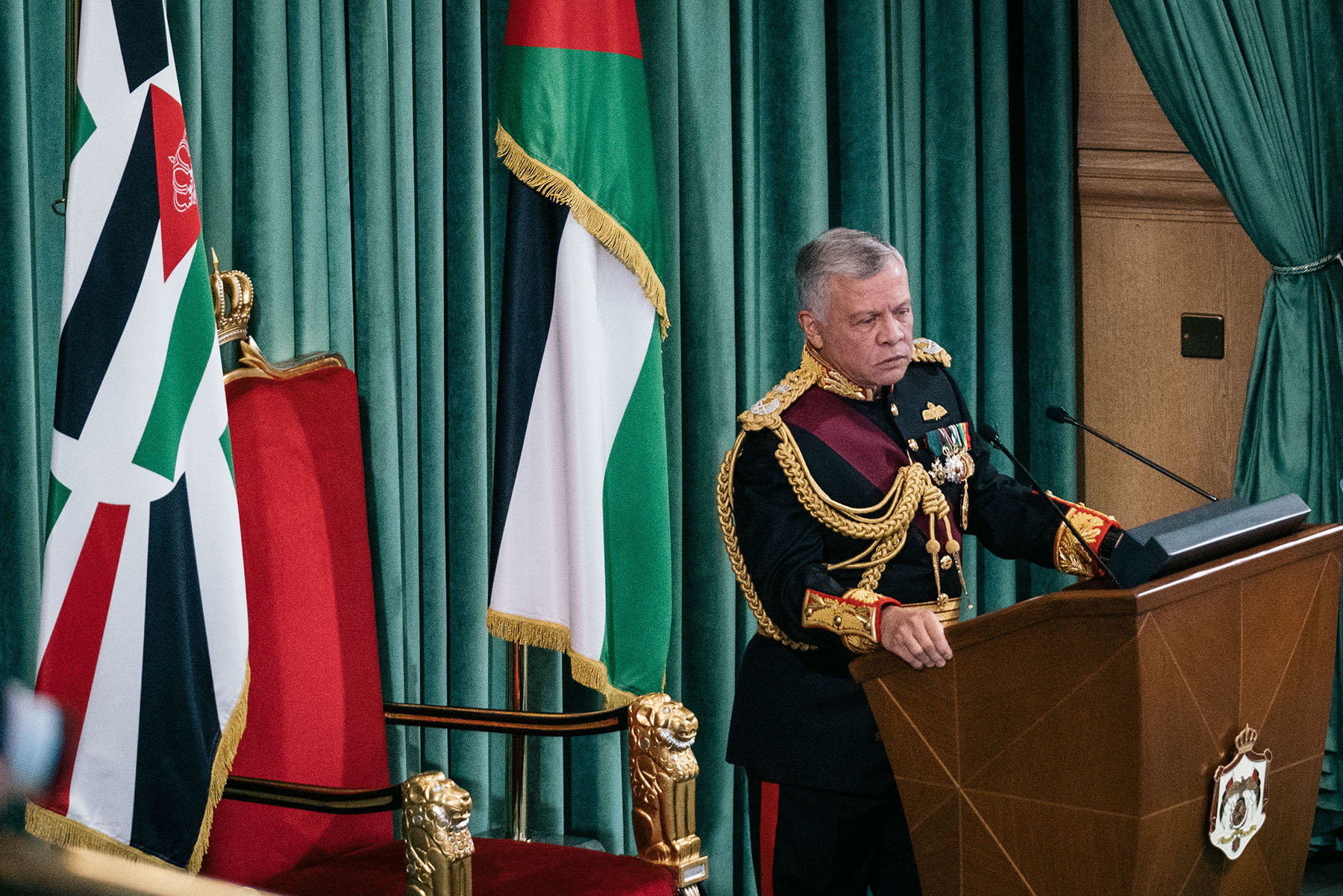Updated on October 30, 2021: On February 10, 2021, the U.N. special rapporteur on the situation of human rights defenders, Mary Lawlor, called on the UAE to release Mohammad al-Roken, raising concerns about his health, detention conditions, and treatment.
Summary
Mohammed al-Roken is an Emirati constitutional lawyer, born in 1962, who has written and commented on many issues in the Persian Gulf. He has called for political reform and for the government to be accountable to citizens. For years, the UAE government subjected al-Roken to arrest and harassment.
The Emirati authorities first detained al-Roken in 2006, after he played a leading role in establishing an Emirati association for human rights. They arrested him again in 2012 and ultimately sentenced him to 10 years in prison for managing and establishing an association that seeks to "overthrow the government" and that has links and affiliations to organizations with "foreign agendas." He remains in al-Razeen prison.
Methodology
DAWN researchers interviewed a source close to the detainee and obtained court documents and other information from published sources that we consider to be reliable, as indicated below. Interviews include the following:
Source H: July 7, July 10, July 14, July 21, July 23, July 26, August 3, and August 16, 2020.
Source H was a defendant in the same case against al-Roken, which involves 94 defendants. We obtained legal documents, warrants, and memoranda from Source H that helped us verify the information, names, and dates in this case. Source H worked extensively with al-Roken and heard multiple accounts of his previous arrests directly from him.
Source A: Interview on September 1, 2020. Source A is very close to multiple individuals in the case.
We do not disclose the identity of these sources to protect their security. We reference them below as "Source H" and "Source A."
Personal Background
Mohammed bin al-Roken is an Emirati lawyer and political activist. Born in Dubai on September 26, 1962, he holds a Ph.D. in constitutional law from Warwick University in the UK. He is married and has five children, three daughters and two sons, the eldest of whom is Rashed.
Professional Background
Al-Roken previously worked as a professor of constitutional law at United Arab Emirates University (UAEU) and as the Chairman of the Committee for the Equivalency of Academic Certificates, a body within the Ministry of Education. On May 27, 2017, he won the 22nd Ludovic Trarieux International Human Rights Prize.
Al-Roken served as a lawyer to the al-Islah Association, an Islamic reformist group in the UAE. In 2011, he and 40 other reformist colleagues sent a letter to the UAE government demanding democratic reforms and elections. Al-Roken spoke out against racial discrimination—globally and in the UAE—and criticized the role and future of sectarianism in the Gulf in 2011.
He also commented on Iran's nuclear program and the closure of the Hormoz strait in 2012, reiterating his earlier position warning against war and escalation. Al-Roken also talked about UAE foreign policy toward Iran and urged the UAE and other Gulf countries to respect human rights. In 2011, Al-Roken said of the UAE political system, "We are citizens in this land, we are not employees."
Time and Circumstances of Arrest
The following information relies on Source H, Source A, interrogation documents, the arrest warrant, and the prosecutor's memorandum against al-Roken and others.
The UAE government first arrested al-Roken in 2006, after he assumed a leading role in founding the al-Islah Association, an Emirati association for human rights. State Security officers arrested him on August 1, 2006, and again on August 23, 2006. The officers did not disclose their names and detained al-Roken with no legal procedure and without providing any reason. On both occasions, the interrogators questioned him about his founding of the association, detained him for a few days, and then released him. According to Sources A and H, State Security officers also confiscated al-Roken's passport, banned him from leaving the country, made him sign a pledge agreeing to stop writing for newspapers and giving interviews, and subjected him to surveillance without any legal proceeding or warrant.
State Security forces arrested al-Roken again six years later on July 17, 2012 at 1:30 am. According to Sources H and A, men dressed in plainclothes arrived in unmarked cars and claimed they were officers of the State Security forces. They intercepted Al-Roken's car, driven by a private driver, as al-Roken was on his way to Rashidia Police Station in Dubai to inquire about his son, Rashed, and his son-in-law, Abdullah Al-Hajri, whom State Security forces had arrested hours earlier without notifying the family. The same officers who arrested al-Roken also detained the driver for about six hours. They handcuffed Al-Roken, seized his mobile phones, and emptied his pockets.
That evening, individuals wearing civilian clothes who self-identified as State Security forces searched al-Roken's house, according to Sources A and H. Inspector Ali Saif led the search, in which the policewoman Ruqia Ahmed participated, and it lasted from 6 pm to midnight.
On August 8, 2012, members of al-Roken's family filed a request to meet with Acting Advocate General Ahmed Rashid al-Dhanhani to discuss his arrest. Al-Dhanhani refused to see them. A staff member in his office told the family that al-Dhanhani had "nothing to do with the case," even though, as head of the federal prosecution, he was responsible for al-Roken's arrest and prosecution. Staff in al-Dhanhani's office also refused the family's requests to visit al-Roken or to release him on bail.
Charges
According to the prosecutors' legal memorandum of indictment obtained by DAWN from a defendant in the same case,
acting Advocate General al-Dhanhani charged al-Roken, along with 93 other activists and intellectuals, with establishing and managing an illegal association, the al-Islah Association, which the Emirati prosecution described as a "Muslim Brotherhood affiliated group" that seeks to overthrow the government and that has links and affiliations to organizations with foreign agendas.
The indictment did not cite any laws that supposedly were violated. Later, in court, the prosecution cited Article 155 of the UAE Penal Code that criminalizes seeking "to collaborate with a foreign country or any one who works for its benefit or communicates with any hostile side, in order to prejudice the State's military, political or economic position." The prosecution kept al-Roken in detention for five and a half months before charging him with any crime.
Trial and Legal Proceedings
This information comes from the interrogation documents in al-Roken's case, the Public Prosecutor's records, and the court records.
- July 18, 2012:
Security officers brought al-Roken to the office of Public Prosecution, before the acting General Prosecutor Mr. Abdel Moneim Khalil and the Secretary of Inquiry, Saif al-Din Sheikh Saad, who authorized his pretrial detention. - August 15, 2012
Unusually, al-Dhanhani prosecuted al-Roken in the Union Supreme Court, which is the Highest Court in the land, rather than in a criminal court of the first instance. Article 99 of the Emirati Constitution gives the Union Supreme Court jurisdiction over certain security-related criminal trials, but DAWN was not able to determine whether prosecutors invoked it in al-Roken's case.At the request of al-Dhanhani, Judge Muhammad Hamad Abd al-Qadir of the Union Supreme Court extended al-Roken's pre-trial detention without the presence of al-Roken or his lawyer. Al-Roken's lawyer, Abdul Hamid al-Kumaiti, filed an appeal with then-President of the Union Supreme Court Abul Wahab Abdool against the extension. The court registered the appeal under No. 1/2012 in accordance with Article 110 of the Criminal Procedure Law. However, Abdool, the President of the Union Supreme Court, refused to hear the appeal, according to Source H.
Al-Roken's case was already in the highest court, and he had no further recourse.
September 5, 2012
At the request of al-Dhanhani, Judge Muhammad Abd al-Qadir extended al-Roken's 30-day pre-trial detention for a second time, again without the presence of al-Roken or his lawyer.September 23, 2012
Despite requests submitted by al-Roken's family, state security interrogators inside al-Wathba Prison refused to receive the paperwork that would allow al-Roken to give his family power of attorney to manage his affairs, according to Source H, who spoke to family members.- January 2, 2013
According to Source H, who spoke to al-Roken's lawyer, Abdul Hamid al-Kumaiti, during the pretrial detention, al-Kumaiti filed multiple complaints with the Union Court, to no avail. On January 2, 2013, al-Kumaiti filed a complaint with Judge Abd al-Qadir at the Union Supreme Court, in the presence of a representative of the Head of the State Security Prosecutor's Office, Mohamed Mostafa El-Baroudy. In the complaint that Source H obtained, al-Roken's lawyer stated that, although he had filed complaints during previous pre-trial extension sessions, State Security was still violating al-Roken's right to due process and to a fair trial. - January 20, 2013:
Al-Roken appeared before the Prosecutor Saqr Saif al-Naqbi, the First Deputy of the State Security Prosecutor's Office, and Muhammad al-Amiri, Secretary of Inquiry, as part of preparations for issuing an indictment. - January 27, 2013:
On January 27, 2013, the State Security Prosecutor's Office indicted al-Roken and assigned him to Case No. 79/2012. The Court conducted 14 sessions in the case. - March 4, 2013:
The first session took place on March 4, 2013, at the State Security Circuit within the Union Supreme Court in Abu Dhabi before a tribunal made up of Presiding Judge Falah Al-Hajri, Judge Muhammad Hamad Abd al-Qadir, and Judge Abdul Rasul Tantawi. Acting Advocate General al-Dhanhani charged al-Roken and 93 others with seeking to overthrow the government and maintaining links and affiliations to organizations with foreign agendas by establishing and managing the al-Islah Association. Al-Dhanhani asked for the "harshest sentence" against them. - March 11, 2013:
In the second session, the 94 defendants asked for a temporary release and complained of mistreatment and procedural violations. - March 18, 2013:
In this third session, al-Dhanhani offered testimony from witnesses, all state officials, who, he said, testify to the "hidden agenda" of the al-Islah association and its links to the Muslim Brotherhood: Abdullah Murad al-Balushi, Colonel of the Security Service; Jassim Mohammed Saif, Major in the Security Apparatus; and Ali Saif Al-Mazrouei, Captain of the Security Apparatus. - March 19, 2013:
In the fourth session, al-Dhanhani introduced the organizational structure and annual plan of the al-Islah Association as "evidence" that defendants were conspiring against the state. - March 26, 2013:
In the fifth session, al-Dhanhani presented secretly recorded videos and audio records of the individuals in their meetings, which the prosecutor said proved the allegations against them. The defendants said these were lawful meetings to discuss educational events. - April 16, 2013:
In the sixth session, al-Dhanhani presented results of the forensic evidence that links the videos of the meetings of the al-Islah association to the defendants. The defendants said they were regular meetings of al-Islah to organize educational training and courses. - April 30, 2013:
In the seventh session, the lawyer of al-Roken and others, Abdul Hamid al-Kumaiti, presented defense witnesses who testified that the defendants had always been loyal to the country and its leaders. Al-Kumaiti said he could call 65 people who would testify that these defendants were innocent. - May 6, 2013:
In the eight session, defense lawyer Abdul Hamid al-Kumaiti continued arguments and he joined by a new defense lawyer, Amal Khamees. - May 7, 2013:
In the ninth session, the defense continued offering testimony. Despite repeated prior requests from the defendants, the Court did not supply the case files and documents containing the state's "evidence" to the defendants until this session. - May 13, 2013:
In the tenth session, the lawyer al-Kumaiti continued his defense. - May 14, 2013:
In the eleventh session, the lawyer al-Kumaiti argued that procedural violations had taken place and questioned the validity of the "confessions" used by the prosecutors. - May 20, 2013:
In the twelfth session, according to Source H, al-Roken presented his defense. He submitted a defense memorandum, excerpts of which DAWN obtained, in which he wrote:"I admit that I communicate with foreigners because of the nature of my work, but to be charged with a "crime" of being a member of a human rights association that I helped establish in 2006?! This is nonsense!" Al-Roken added, "Some of the defendants were coerced into signing confessions after being interrogated for eight hours continuously. The defendants' statements in police reports were dictated to the defendants."
Al-Roken denied trying to overthrow the regime, saying it would be impossible to do so, and that he and his co-defendants had not attempted it.
May 21, 2013:
In the thirteenth session, the defense lawyer addressed the prosecution's claim that the defendants had links to international organizations like Human Rights Watch and asked that the prosecutors present proof of any specific criminal activity.July 2, 2013:
At the fourteenth session, the Court sentenced al-Roken to ten-years imprisonment, followed by three-years probation. The court also convicted 68 other defendants and sentenced them to prison terms ranging from seven to 15 years. It justified the ruling under Articles 117, 180, and 182 of the Penal Code.The Union Supreme Court refused to grant al-Roken permission to appeal the verdict, for unstated reasons. Although Emirati law grants criminal defendants a right of appeal, al-Roken's case was tried in the highest judiciary instance, leaving no higher court to which he could appeal.
Detention Conditions
The following information relies on Source H and the legal documents, including the interrogation documents, the arrest warrant, the prosecutor's memorandum against al-Roken, and others.
According to al-Roken's defense brief, of which DAWN researchers obtained a copy, the State Security forces arrested al-Roken and held him in an unofficial detention center for eight months, from his initial arrest on July 17, 2012, until March 9, 2013, just after his trial sessions began. He was in solitary confinement from July 17, 2012, until September 19, 2012. At that point, according to statements by his family to Sources H and A, he was released from his isolation cell and allowed to see the sun for the first time in 62 days. According to those sources, al-Roken contacted his brother Khaled Al-Roken on September 23, 2012, and told him that the guards had not let him outside again after September 19 and that he had lost nine kilograms since the beginning of his imprisonment.
He said the prison guards denied him access to books sent by his family. On a number of occasions between July 2012 and January 2013, when he asked to use the bathroom, the guards in the unofficial detention facility made al-Roken wait for an unnecessarily prolonged period of time before removing all his clothes and blindfolding him, according to al-Roken's defense memorandum, of which DAWN obtained a copy, and to Source H who spoke to al-Roken's family members.
In March 2013, the authorities transferred him to al-Wathba Prison and held him there until July 2013. Government authorities have held al-Roken in al-Razeen Prison in Abu Dhabi since July 2013.
When the family of al-Roken arrived at al-Wathba Prison for a regularly scheduled visit on June 29, 2013, guards told them that Captain Matar al-Balushi from al-Wathba Prison had issued an order on June 28, 2013, preventing al-Roken and three other prisoners from making phone calls or receiving visits.
According to Source A, al-Roken's family said that al-Roken reported that the undisclosed guards at al-Razeen prison did not allow him a chair or bed inside the cell, forcing him to sleep on the floor for weeks. They prohibited him from using pens and paper or submitting requests to the public authorities; they forbade him from reading books and newspapers; they denied him access to the Internet, and they refused to give him his eyeglasses.
At the Union Supreme Court hearing on May 20, 2013, al-Roken described his detention conditions, reading from the defense memorandum he wrote, of which DAWN obtained a copy:
What we have been going through for ten months is so hard. The prison is not a 5-star prison as they claim. It's not easy for us to be blindfolded, naked in the bathroom, and trying to access soap. It is very hard to know that my son has his chest hair torn. [The government arrested Al-Roken's son, Rashed, in his mid-40s, on July 17, 2012, and allegedly tortured him]. It is very painful to hear that our families are waiting outside in the very hot weather to see us.
On July 30, 2013, the State Security General Prosecution removed al-Roken from the country's list of lawyers at the request of the Department of Justice, barring him from working as a lawyer.
In May 2013, al-Roken asked to send a letter to Interior Minister Saif bin Zayed describing his mistreatment, and in October 2013, al-Roken asked to send a similar letter to bin Zayed and UAE President Sheikh Khalifa bin Zayed Al Nahyan, but the prison administration refused to deliver them, according to Sources H and A.
According to Sources A and H, al-Razeen prison guards did not allow al-Roken to use the toilet or access any of his personal items, including his clothes and Qur'an, at least for two days approximately in December 2013. In his May 2014 letter to the Minister of the Interior, al-Roken described the maltreatment he and his fellow inmates experienced at al-Razeen Prison:
- Depriving prisoners basic necessities like suitable clothing.
- Denying prisoners physical contact with family members during visits.
- Placing prisoners in solitary confinement for trivial reasons for a week to ten days at a time. Guards would put them in small cells infested with insects and mosquitoes that lacked basic necessities such as furniture, a Qur'an, and hygienic items like soap, toothbrush, and shampoo.
- Eavesdropping on prisoners' twice weekly phone calls with their families, cutting the line and reducing the call time from 15 minutes to a few seconds.
- Confiscating prisoners' personal belongings such as notebooks, personal messages, pictures of their children, pens, and even their underwear.
- Subjecting prisoners to malnutrition due to insufficient and low quality food.
- Preventing prisoners from buying personal necessities by closing the prison canteen for periods lasting up to two months.
- Subjecting prisoners to solitary confinement if they refuse to shave their hair.
- Mistreating prisoners' relatives during family visits.
- Interfering with family visits by frequently imposing new limitations.
- Prohibiting families from wearing medical sunglasses for eye protection from intense sunlight during visits.
- Providing inappropriate reception rooms and toilets for families.
- Denying conjugal visits and private family visits even if the family obtained official permits to do so.
In November 2015, according to Sources H and A, al-Roken reported to his family that the guards in al-Razeen subjected him to torture by playing the national anthem at high volumes for a day, until al-Roken fainted from an increase in blood pressure. Although he rang emergency bells in his cell, no one assisted him. In the morning of the next day, the prison authorities began playing loud music again. Al-Roken felt pain in his ear, and the guards transferred him to the prison clinic where he was diagnosed with an ear infection. The al-Razeen prison guards then placed him in solitary confinement for a few days and denied him family visits for a few weeks.
Al-Roken told his family that the isolation cell looked like a "coffin" and that all of its windows were blocked with cement and bricks.
Impact on Family
According to al-Roken's family members, as they reported to Source H,
- State Security officers arrested al-Roken's son Rashed in addition to al-Roken's son-in-law Abdullah al-Hajri just hours before al-Roken's arrest. ٍRashed al-Roken remained in jail and was one of the 94 defendants, alongside his father and his brother-in-law, Abdullah al-Hajri. However, on July 2, 2013, the authorities exonerated and released al-Hajri and Rashed al-Roken.
Violation of Rights
The Right to Freedom of Expression, Association, and Participation in Public Affairs
Article 19 of the Universal Declaration of Human Rights ('Universal Declaration') guarantees individuals the right to freedom of opinion and expression. Governments cannot, under Article 19, restrict the right of citizens to engage in political discussion and debate (see, A/HRC/RES/12/16). Article 20 of the same document grants the right to freedom of peaceful assembly and association.
In detaining al-Roken, the UAE sought to restrict his peaceful exercise of the aforementioned rights. In expressing criticism of the UAE's policies and leadership, al-Roken engaged in the form of political debate which receives heightened protection under Article 19 (see, General Comment 34, para. 34). Arbitrarily arresting individuals for peaceful dissent is incompatible with the right to freedom of expression and assembly (see, General Comment 34, para. 23).
[Article 18-20, Universal Declaration of Human Rights (UDHR); Article 19, 22, 25, The International Covenant on Civil and Political Rights (ICCPR)]
The Right to a Fair Trial
Article 10 of the Universal Declaration grants individuals the right to a fair and public hearing by an independent and impartial tribunal. Article 13(1) of the Arab Charter on Human Rights provides that "everyone has the right to a fair trial that affords adequate guarantees before a competent independent and impartial court." The UAE violated this provision in its prosecution and sentencing of al-Roken.
The prosecutor's legal memorandum laid uncertain and vague charges against al-Roken, and the prosecutor, al-Dhanhani, kept al-Roken in detention for more than five months before even charging him with a crime. The Court lacked sufficient independence from the executive for the trial to meet the standards of an independent and impartial tribunal established by law (see General Comment 32, para.19), and it convicted al-Roken based on insufficient evidence, including confessions that, according to al-Roken, were coerced. The charges ultimately laid against him were vague and imprecise, preventing the launch of an effective legal defense. Al-Roken had no opportunity to appeal the verdict and sentence. There is also evidence that the UAE authorities used torture to obtain confessions.
Taken together, these factors indicate an undeniable violation of al-Roken's right to a fair trial. The United Nations Working Group on Arbitrary Detention found that the UAE government's treatment of al-Roken's case had indeed violated Article 10 of the Universal Declaration (see, Opinion No. 60/2013, para. 23).
[Article 10, UDHR; Article 13, 14, 16, Arab Charter on Human Rights; Article 14, ICCPR]
Freedom from Arbitrary Deprivation of Liberty
Article 9 of the Universal Declaration of Human Rights guarantees that no individual shall be subjected to arbitrary arrest, detention, or exile.
The United Nations Working Group on Arbitrary Detention hears cases of individuals who claim to have been detained in violation of Article 9. In November 2013, the Working Group found that the UAE had violated Article 9 in al-Roken's case, along with 60 other detainees whom it also found to be arbitrarily detained (see, Opinion No. 60/2013).
The UAE authorities detained al-Roken incommunicado without any legal justification following his arrest. They extended his detention without allowing him or his lawyer to attend the hearing. The UAE's detention of al-Roken violated his right to freedom of expression, and thus also falls under the Article 9 definition of 'arbitrary.' Similarly, UAE State Security based his detention on proceedings that so gravely infringed upon his right to a fair trial that they must be adjudged to be arbitrary (see Opinion No. 60/2013, para. 24).
The Right to Humane Treatment and the Prohibition of Torture
Article 5 of the Universal Declaration prohibits the use of torture absolutely. The Constitution of the United Arab Emirates also guarantees this right under Article 26, stating, "No person shall be subjected to torture or to degrading treatment." The UAE is also party to the Convention Against Torture and Other Cruel, Inhuman or Degrading Treatment or Punishment.
The UAE authorities subjected al-Roken to torture and/or degrading treatment, thus breaching their international and domestic human rights obligations. They subjected him to loud music for extended periods of time, damaging his ears. The authorities also placed him in solitary confinement for extended periods of time, which al-Roken described as a "coffin." They denied him access to a bathroom and exposed him to very bright light. This treatment constitutes a breach of the absolute prohibition on torture or degrading treatment under Article 5 of the Universal Declaration.
[Article 26, Constitution of the United Arab Emirates; Article 5, UDHR; Article 7, ICCPR; Article 2, 10 (1, 2), Convention against Torture and Other Cruel, Inhuman or Degrading Treatment or Punishment (CAT)]
The right to communicate with the outside world, especially with family
Captain al-Balushi issued an order preventing al-Roken and three other prisoners from receiving their scheduled family visits or communicating with their families, without justification, in violation of international standards for the treatment of prisoners.
[Principle 19, Body of Principles for the Protection of All Persons under Any Form of Detention or Imprisonment; Rule 37, Standard Minimum Rules for the Treatment of Prisoners].
Officials Involved in Prosecution and Detention
The following information relies on the court's legal memorandum, the arrest warrant, interrogation documents, and the account of Source H.
Captain Ali Saif: Police Inspection Officer
[PHOTO NOT AVAILABLE. IF YOU HAVE PHOTOS AVAILABLE, PLEASE EMAIL UAEINFO@DAWNMENA.ORG]
On July 17, 2012, Inspector Ali Saif led a search of al-Roken's house. He and the other officers wore civilian clothing, identified themselves to al-Roken's family members as officers of the Department of State Security, and refused to show any legal warrant. The search lasted from 6 pm to midnight. They took some of al-Roken's electronic devices.
Policewoman Ruqia Ahmed: UAE Policewoman
[PHOTO NOT AVAILABLE. IF YOU HAVE PHOTOS AVAILABLE, PLEASE EMAIL UAEINFO@DAWNMENA.ORG]
On July 17, 2012, Policewoman Ruqia Ahmed, dressed in civilian clothing, participated in a warrantless search of al-Roken's house, from 6 pm to midnight.
Acting Advocate General Ahmed Rashid al-Dhanhani
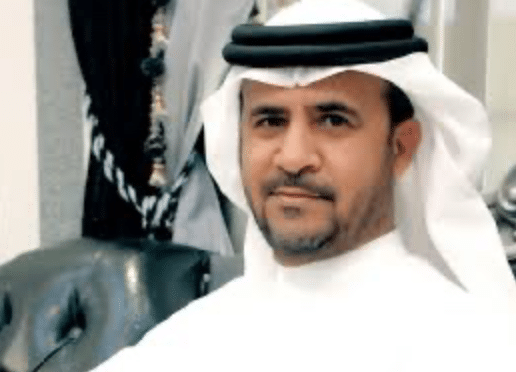 In 2009, al-Dhanhani became the acting Advocate General and remained in that position until approximately April 2017. He prosecuted al-Roken and his co-defendants in the case for their peaceful speech and advocacy, which are protected by international law, and he enforced prima facie unjust laws that criminalize dissent.
In 2009, al-Dhanhani became the acting Advocate General and remained in that position until approximately April 2017. He prosecuted al-Roken and his co-defendants in the case for their peaceful speech and advocacy, which are protected by international law, and he enforced prima facie unjust laws that criminalize dissent.
Although Emirati law permits authorities to hold a suspect in detention for just 14 days before charging him with a crime, al-Dhanhani took advantage of a provision that allows prosecutors to ask judges to extend detention for suspects indefinitely.
He requested the renewal of al-Roken's detention for six months before charging him, and enforced it after the Union Supreme Court ordered it. He requested that detention in hearings held without the presence of al-Roken or his lawyer, and without providing them with evidence justifying the detention. He asked the court to impose the "harshest sentence".
On August 8, 2012, al-Dhanhani refused to see the family of al-Roken and others when they inquired about al-Roken's arrest. Staff in al-Dhanhani's office also refused the family's requests to visit al-Roken or to release him on bail.
Former Attorney General Salem Saeed Salem Kubaish
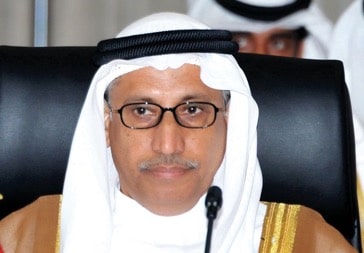 Kubaish was Attorney General during al-Roken's prosecution and remained in that position until his retirement in October 2016. As Attorney General, Kubaish oversaw the work of Advocate General al-Dhanhani, who was in charge of prosecutions. Under Kubaish's supervision, al-Dhanhani prosecuted al-Roken and his co-defendants for their peaceful speech and activities protected by international human rights law and enforced prima facie unjust laws that criminalize dissent. He also oversaw the requests for pretrial detention and for a harsh sentence.
Kubaish was Attorney General during al-Roken's prosecution and remained in that position until his retirement in October 2016. As Attorney General, Kubaish oversaw the work of Advocate General al-Dhanhani, who was in charge of prosecutions. Under Kubaish's supervision, al-Dhanhani prosecuted al-Roken and his co-defendants for their peaceful speech and activities protected by international human rights law and enforced prima facie unjust laws that criminalize dissent. He also oversaw the requests for pretrial detention and for a harsh sentence.
Counselor (Judge) Falah al-Hajri, a judge at the Union Supreme Court
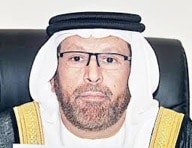
Judge Falah al-Hajri was the head of the judicial panel that convicted al-Roken and his co-defendants.
He did so based on confessions obtained in unofficial detention centers and under coercion, even though the defendants testified about the coerced nature of the confessions.
Al-Hajri also ignored the defendants' allegations of torture and mistreatment. He convicted al-Roken and his co-defendants for their peaceful activism and affiliations, protected by international guarantees of freedom of expression and association, based on prima facie unjust laws.
Judge Muhammad Hamad Abd al-Qadir, judge at Union Supreme Court
[PHOTO NOT AVAILABLE. IF YOU HAVE PHOTOS AVAILABLE, PLEASE EMAIL UAEINFO@DAWNMENA.ORG]
Abd al-Qadir extended al-Roken's pretrial detention five times, before prosecutors even charged al-Roken with a crime, even though he knew that the State Security held al-Roken in an unofficial detention center, in violation of UAE law. He did so without summoning al-Roken or his lawyer to the hearing, a gross violation of Article 110 of the UAE Criminal Procedure Law, which gives a defendant the right to be present at such hearings, and in violation of international standards of due process.
Abdul Wahab Abdool, former President of the Union Supreme Court in the UAE
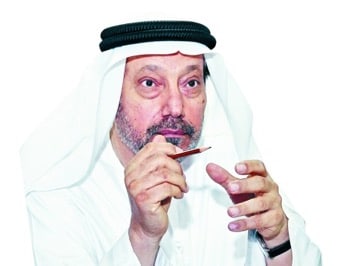
Abdool was President of the Union Supreme Court during al-Roken's trial.
On August 15, 2012, al-Roken's lawyer, Abdul Hamid al-Kumaiti, filed an appeal with Abdool against the decision to extend al-Roken's pre-trial detention.
Abdool ignored the appeal and did not rule on it.
Captain Matar al-Balushi: Official at al-Wathba Prison
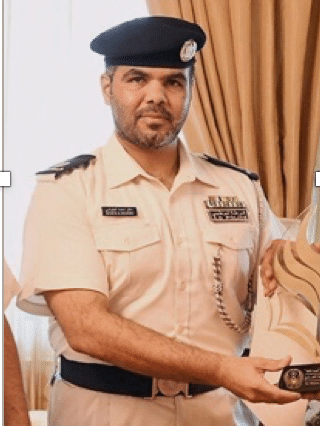 On June 28, 2013, Captain al-Balush filed an order, without justification, preventing detainees Mohammed al-Roken, Mohammed al-Mansoori, Salem al-Shehhi, Khalifa al-Nuaimi, Waleed al-Shehhi, and Abdullah al-Hadidi from receiving their regularly scheduled family visits.
On June 28, 2013, Captain al-Balush filed an order, without justification, preventing detainees Mohammed al-Roken, Mohammed al-Mansoori, Salem al-Shehhi, Khalifa al-Nuaimi, Waleed al-Shehhi, and Abdullah al-Hadidi from receiving their regularly scheduled family visits.
In doing so, he violated basic standards of treatment for prisoners protected by international law.
Local Emirati Coverage
In the UAE, the government directly controls and oversees all media outlets and press agencies through the National Media Council, a federal government body established by Federal Law No.11 of 2016.
On July 15, 2012, the Emirati Foreign Minister tweeted, "Yes a small little cabal that knows itself really well." He added on Twitter "My question to these clowns is, why do you hate the UAE?!"
On September 20, 2012, Emirates Today Newspaper, a UAE government-aligned outlet, published a news report accusing the case's 94 detainees of establishing a militant wing of the Muslim Brotherhood in the UAE.
On November 12, 2012, the former head of the Dubai Police Dhahi Khalfan commented on the case on a show called "The Arab Street" on Dubai TV; He claimed that the detained individuals said that the government in the UAE is not acceptable and that they wanted to change it. He elaborated, "They are part of an unclean and impure organization."
On January 1, 2013, Fadheelah al-Moaini, an Emarati columnist, published a piece in the daily edition of Al-Bayan Newspaper, a UAE government-aligned outlet, accusing the detainees of orchestrating a coup.
On January 31, 2013, Mair Ghani Motasim, a Sudanese writer who writes for an Emirati newspaper, published a piece in the Roya Newspaper, a UAE government-aligned outlet, that called the detainees "backward conspirators against the civilized state of the UAE." The website deleted the piece, but DAWN saved an archived version here.
In February 2013, the al-Muzmat Center for Studies and Research, a center within Zayed University in the UAE, organized a panel on "the dangers of the Muslim Brotherhood." In the presence of Minister of Education Sheikh Nahyan bin Mubarak Al Nahyan, the panelists discussed the 94 detained individuals, including al-Roken, as an example.
In December 2013, al-Arabiya, a Saudi government-controlled TV channel and website, aired a two-episode program accusing the detainees of establishing a secret organization and faction of the Muslim Brotherhood.
On November 25, 2015, former head of the Dubai Police Dhahi Khalfan sent out multiple tweets calling al-Islah and the detained intellectuals and activists "a bunch of Muslim Brotherhood members who committed serious crimes."
In May 2017, Abu Dhabi TV, a UAE government-controlled TV channel, aired a four-episode program called "The Corridors of Darkness" in which they presented the 94 detainees, including al-Roken, in the case as traitors and conspirators who had planned to overthrow the government.
In August 2018, Emirate TV, a UAE government-controlled TV channel, aired a 30-episode dramatic series titled "Betraying the Nation" in which they portrayed the 94 detainees as traitors.
International Reactions
- In August 2013, the United Nations Working Group on Enforced Disappearances issued a statement addressing the plight of detained al-Islah members and calling for their release.
- In September 2012, the Secretary General of Amnesty International spoke about Mohammed al-Roken and the detainees and condemned the crackdown against intellectuals and activists.
- The United States State Department's 2012 report on the UAE's human rights record mentioned al-Roken. The report described him as a lawyer and said he was among "individuals critical of the government."
The United States State Department again included al-Roken and the case's other detainees in their 2013 annual report as political prisoners.
- On February 10, 2021, the U.N. special rapporteur on the situation of human rights defenders, Mary Lawlor, called on the UAE to release Mohammad al-Roken, raising concerns about his health, detention conditions, and treatment.




























